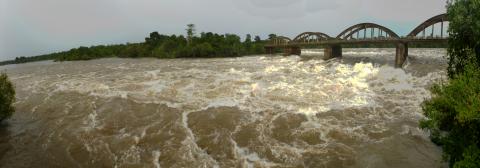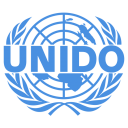ECREEE and UNIDO support the new Government of Guinea Bissau in reaching Sustainable Energy For All (SE4ALL)
The Global Environment Facility (GEF) funded project "Promoting Renewable Energy Investments in the Electricity Sector of Guinea Bissau" is implemented by UNIDO in close cooperation with the Ministry of Energy and Industry, the Ministry of Natural Resources, the ECOWAS Centre for Renewable Energy and Energy Efficiency (ECREEE) and TESE – Associação para o Desenvolvimento pela Tecnologia, Engenharia, Saúde e Educação. The project is also promoted by the Small Islands Sustainable Energy and Climate Resilience Initiative (SIDS DOCK).
The project addresses the existing energy challenges of the country by promoting renewable energy investments in the electricity sector. The combined and integrated interventions in the areas of technology demonstration, policy support and capacity building will create an enabling environment for the scaling-up of renewable energy investments.
The GEF project assists the Government to develop a coherent vision and road-map on how to achieve SDG-7 by 2030. The developed National Renewable Energy Action Plan (NREAP), the National Energy Efficiency Action Plan (NEEAP) and the SE4ALL Access Agenda set targets for renewable energy, energy efficiency and access to energy services by 2030. The targets are also the basis for the energy related mitigation targets of the country in the NDC. The documents were validated in several national workshops. The national policy process was closely coordinated with the regional ECOWAS sustainable energy policy process led by ECREEE.
Through these action plans, the country aims at 50% renewable energy penetration in the power sector by 2030. Most of it will come from domestic or imported hydropower resources. The rest will mostly come from solar and bioelectricity sources. In this scenario, around 80% will have access to electricity services and 75% access to modern cooking services. Around 9% of the population would be served by renewable energy based hybrid mini-grids and stand-alone systems.
Based on the policy documents the National Sustainable Energy Investment Plan (NSEIP) was developed. The Plan includes a concrete pipeline of investment projects directed to attain the established renewable energy, energy efficiency and energy access targets by 2030. The pipeline of identified priority projects has an investment volume of USD 680 million. The project pipeline is currently presented by the Government and UNIDO to investors and financiers in a series of investment workshops and conferences in and outside of Guinea Bissau.
Moreover, the GEF project has provided key pre-investment support for a number of projects of the NSEIP and succeeded in “pitching” them to investors and financiers. Under the investment component a set of renewable energy projects is being supported in partnership with various partners. The projects cover innovative technology areas such as medium-scale grid-connected solar PV, solar PV hybrid mini-grid systems (between 312 to 500 kW) and PV stand-alone systems for rural electrification and productive uses, as well as bioelectricity systems for industrial facilities in the fishery and cashew processing sectors. Up to now, more than USD 50 million of co-financing has been mobilized for the implementation and development of renewable energy investment projects. An important focus was on the development and implementation of renewable energy hybrid mini-grid projects.
A dedicated grant facility to promote renewable energy projects was established in partnership with ECREEE. The first call of the ECOWAS Renewable Energy Facility (EREF) for Guinea-Bissau was executed. Some of the selected projects are currently under implementation. This support is being upscaled through the Regional Off-Grid Electrification Project (ROGEP) funded by the World Bank and their Lighting Africa Program. The project targets all fifteen ECOWAS countries, including Guinea Bissau. The project has a volume of USD 200 million and will be implemented in partnership with ECREEE, the West African Development Bank (BOAD) and the ECOWAS Bank for Investment and Development (EBID). It promotes the uptake of markets for small-scale PV stand-alone systems (solar lanterns, solar home systems, solar water pumps, solar mills, solar sewing machines through risk mitigation (e.g. guarantees) and entrepreneurship support.
The GEF project is also facilitating the development of the hydropower project Salthino HPP (19 MW) in the context of the OMVG interconnection project comprising Guinea, Guinea Bissau, The Gambia and Senegal. The project is important for making the 2030 renewable energy scenario of the country a reality. The initial works of UNIDO and ECREEE have resulted into a partnership with OMVG, AfDB and OeEB on the development of the feasibility assessments and studies.
UNIDO facilitated the development of a comprehensive renewable energy capacity building program which is currently under implementation in partnership with various internal and external partners. Through the involvement of ECREEE, knowledge exchange and joint capacity building between the Portuguese speaking Guinea Bissau, Cabo Verde and Sao Tome and Principe was established. So far, more than one hundred experts from Guinea Bissau were trained on key renewable energy issues (e.g. mini-grids, entrepreneurship). Several tools were developed and are made available in Portuguese (e.g. tariff calculator for mini-grids).
Results:
- 312 kw PV hybrid system Bambadinca Sta Claro installed (watch the documentary on the project)
- National Renewable Energy Action Plan developed
- National Energy Efficiency Action Plan developed
- SE4ALL Action Agenda developed
- Sustainable Energy Investment Prospectus (incl. project pipeline) developed
- 1st call of the ECOWAS Renewable Energy Facility (EREF) for Guinea Bissau launched
- Feasibility Studies on the PV mini-grid replication projects Bolama and Bubaque
- Baseline Study on the Biomass Electricity Generation Potential in Guinea Bissau
Please do not hesitate to contact the project team:
• Mr. Martin Lugmayr, UNIDO Project Manager, m.lugmayr@unido.org
• Mr. Eder Semedo, ECREEE Project Manager, esemedo@ecreee.org
• Mr. Julio Antionio Raul, National Project Manager, antoniobolo2005@gmail.com
• Mr. David Avonso and Ms. Sara Dourado, TESE, d.afonso@tese.org.pt
• Mr. Al Binger, SIDS DOCK Senior Energy Advisor, abinger@sidsdock.org





